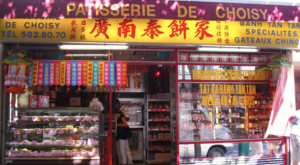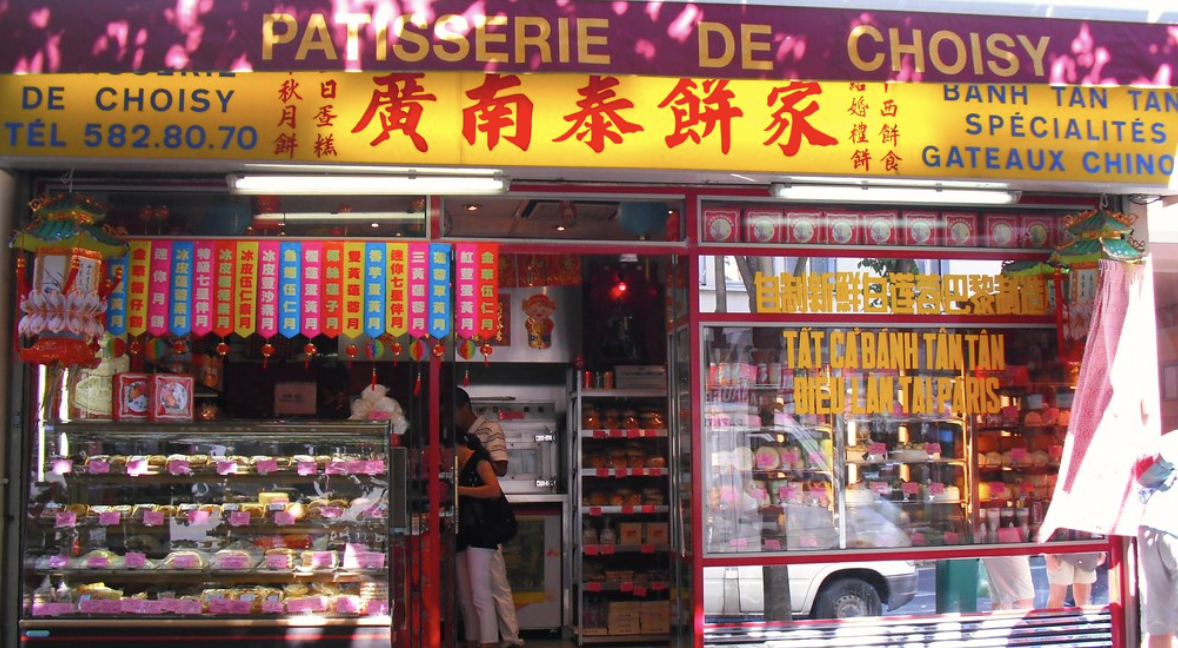Imagine a Paris that transcends the Seine and the Eiffel Tower, a Paris rarely captured in glossy Lonely Planet bestsellers. I always found myself in this world less traversed — Paris Chinatown, a vibrant testament to cultural resilience nestled amidst the city’s iconic landmarks. Far from the romanticized vignettes of Emily in Paris and sleek AirFrance ads playing “a hymn of elegance,” Chinatown offers an authentic slice of life that challenges our preconceived notions of what Paris “should be.” At Porte de Choisy, I was greeted by the tantalizing aromas of traditional Hong Kong-style bakeries, the smoky air of a bustling Cambodian café, the family-run Vietnamese restaurants buzzed with life where a child is (always) engrossed in homework at the cashier counter. While it healed my homesickness after I was satisfied from slurping Phở bò, this multicultural enclave has surprised me with a rare, if not unfamiliar, ambiance that is no longer thriving in Asia.
There was a shared confusion among my social circle when my friends asked me “What did you do in Paris?” my answer has always been “I was in Chinatown and I bought some snacks and food there.” Despite the awkward pause that followed, my ecstasy of discovering an authentic Laotian restaurant was met with “Oh cool, but what else? Like anything fun?” Usually, I would smile it off and walk away. It is, however, a sad truth that “a fun weekend in Paris” is seemingly expected to be “clubbing in some cool places” or something definitely irrelevant to Chinatown. I might not understand why clubbing is that fun, just like why they might not grasp the joy and comfort I find in the simple pleasures of Chinatown.
I realize my homesickness has been ‘excessive’ to say the least. My Asian identity and culture are so crucial in my life that a baguette can never replace a Pineapple Bun, and pasta will not be an alternative to rice noodles. Food aside, Chinatown serves as a safe community where I see people who look similar to me, servers who do not resort to horrible manners if my Bonjour already sounds so unnatural to them, and a place where I am not the odd one out.
 In a Cambodian restaurant, my awkward B1 French haunted me. I could not fluently complete what comes after “Je voudrais” but the middle-aged Asian server subsequently asked in Mandarin Chinese “你想吃什麼,這個嗎” (What do you like to have? This?), her pointing at the picture on the menu. With surprise, I could tell her Mandarin had such a thick Southern accent so she might speak Cantonese, my mother tongue which is widely spoken in Southern China, Macau, and Hong Kong. To test my theory, I asked directly “你識唔識講廣東話” (Do you speak Cantonese?) What stunned me more was her flawless Cantonese accent. According to her, she was a Cambodian-born Chinese who practiced Cantonese at home with her parents. This was not my first time enjoying this language privilege in this foreign land; in a Vietnamese salon in Lyon, the 68-year-old hairdresser was a polyglot who spoke perfect Cantonese to me, telling me her story as a Vietnamese refugee in Paris after Saigon was taken over by communists. I have heard countless intriguing stories of immigrants from Indochina and China who sought a better life in France. Chinatown is like a history book, each immigrant’s tale adding a vivid chapter to the mosaic of new life in France.
In a Cambodian restaurant, my awkward B1 French haunted me. I could not fluently complete what comes after “Je voudrais” but the middle-aged Asian server subsequently asked in Mandarin Chinese “你想吃什麼,這個嗎” (What do you like to have? This?), her pointing at the picture on the menu. With surprise, I could tell her Mandarin had such a thick Southern accent so she might speak Cantonese, my mother tongue which is widely spoken in Southern China, Macau, and Hong Kong. To test my theory, I asked directly “你識唔識講廣東話” (Do you speak Cantonese?) What stunned me more was her flawless Cantonese accent. According to her, she was a Cambodian-born Chinese who practiced Cantonese at home with her parents. This was not my first time enjoying this language privilege in this foreign land; in a Vietnamese salon in Lyon, the 68-year-old hairdresser was a polyglot who spoke perfect Cantonese to me, telling me her story as a Vietnamese refugee in Paris after Saigon was taken over by communists. I have heard countless intriguing stories of immigrants from Indochina and China who sought a better life in France. Chinatown is like a history book, each immigrant’s tale adding a vivid chapter to the mosaic of new life in France.
What connects us is the same language we speak — Cantonese, and most importantly, Chinatown. The place holds so much more diversity than a Sciences Po admission brochure. At some point, I was contemplating whether I was obsessed with this place purely because of my homesickness. Is this really like home? Is this what Hong Kong looks like?
No, it does not feel like home. It is a time capsule in which a last-century Asia has been preserved and frozen in this arrondissement in 2023 Paris. In rapidly developing Asia, where economies have burgeoned after Communist China opened up its economy, we see a dramatic transformation. Mass constructions of high risers have demolished traditional houses, humongous chain outlets have replaced family-run businesses, and traditions bore the younger generation with the influx of Westernized pop cultures. The biggest and most concentrated Asian diaspora in Europe has displayed a stark contrast to Asia. The Librarie You Feng, where shelves brim with books in Traditional Chinese, a rarity even in Asia. The owner, well-versed in literature, comes to your assistance, creating a familiar ambiance with Hong Kong news radio playing in the background. At L’Amicale des Teochew en France, one can practice Taoism and Buddhism. This center offers more than just religious teachings; it serves 齋飯, vegetarian meals traditionally prepared for monks as alms, fostering precious cultural preservation among the diaspora. As night descends on Quartier de Chinois, the storefronts, adorned with bold colorful Chinese calligraphy and neon light displays, offer a visual feast that takes you back to Wong Kar Wai’s movies while ironically Hong Kong has started banning neon light signs, a crucial symbol of the city.
After a 13-hour flight from Hong Kong, I was truly impressed by the culture this mysterious oriental enclave has retained. I deeply admire how the veteran Asian immigrants endeavor to preserve our heritage. While a tapestry of Pan-Chinese traditions has coexisted so vividly and harmoniously, it is changing, too.
With the first-generation immigrants stepping off stage, their kids born and raised in Paris might find themselves in an identity crisis, or distance themselves from Asian cultures. The children of immigrants are more likely to value their citizenship than their “cultural roots” due to language difficulties, racial discrimination in school, and resentment of the countries of their parent’s origin. The gradual fading, if not vanishing, heritage is seen in Chinatowns around the world, including Paris.
While Chinatown has long been a “foreign home” for many Asian international students, it’s also the heart of a community where generations have nurtured their dreams, building a life far from their ancestral homes. This corner of Paris holds a unique allure for me, transcending its role as a culinary destination for French patrons seeking a taste of Asia (and they dine in a Vietnamese restaurant serving sushi.) In Chinatown, I find a profound and ineffable resonance with my own identity that connects me with the people there. There is a majestic power in the way the vibrant streets and fusion of cultures do not just mirror the complexities of my heritage as a Hong Kong native, but amplify them. The blend of history and modernity, the symphony of languages, and the mosaic of traditions are encapsulated in the pulse of Quartier Chinoise that redefines and embraces multifaceted identities. Behind the clichéd scenes on Paris postcards is a place where I find a sense of belonging, where I find most attractive.
Other posts that may interest you:
- The Chair: Sitting With Everyday Violence
- The Trouble with ‘Ecocide’
- Carbon dioxide removal – hit or miss?
- Local Victories for Turkish Opposition — A Sign of Hope?
- Are France and Japan a Mismatch Made in Heaven?
Discover more from The Sundial Press
Subscribe to get the latest posts sent to your email.





